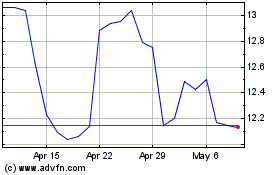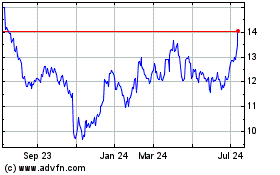Brexit Could Crimp Auto Makers' Fresh Europe Recoveries
July 28 2016 - 12:48PM
Dow Jones News
By Eric Sylvers
After years of financial heartache in Europe, second-quarter
results show global auto makers are finally seeing a turnaround in
the region -- just as Brexit raises a cloud over the industry.
Even as they reported strong underlying second-quarter
performances in Europe over the last week, Volkswagen AG, Ford
Motor Co. and other auto makers flagged the potential drag created
by the U.K.'s vote in June to leave the European Union.
On Thursday, VW noted Brexit's "drastic effect" on financial
markets and the European economy, while Ford said the vote's
outcome could cause the company to miss this year's targets even as
it posted its best-ever second quarter in Europe.
General Motors Co. a week ago said the depressed pound, which is
down about 12% against the dollar near to a 30-year low since the
vote in the U.K., could knock $400 million off its second-half
earnings. Wednesday, Fiat Chrysler Automobiles NV said hedging
would protect this year's results from the sterling's fall, though
should the currency's weakness last into next year the impact will
be felt.
"You can run scenarios, but it's really impossible to make
medium- or long-term forecasts for the car industry because there
is so much uncertainty," said Paolo Martino, a senior consultant at
Frost & Sullivan advising car companies.
European car makers and U.S. rivals with large European
businesses have struggled for years to make money in the region.
Production overcapacity, Europeans' penchant for less-profitable
small vehicles, and high gasoline taxes that muted the effect of
lower global prices have conspired to drag down the results for car
companies in Europe.
While structural challenges remain, such as the overcapacity,
auto executives had recently expressed optimism that Europe could
soon begin to churn out at least modest profits.
That was until the June 23 vote in the U.K.
Now GM's target to earn money in Europe in 2016 after 17 years
of losses is in doubt, as is Fiat Chrysler's bid to build on the
small profit it squeezed out on the continent in 2015 after a
decade of losses.
New car sales have been rising steadily in Europe over the past
three years, though they are still about 10% below the
pre-financial-crisis level. Registrations, a proxy for sales, rose
9.4% in the EU through the first six months of this year. But the
U.K. posted a more modest 3.2% increase with a small decline in
June that some analysts attributed to nervousness ahead of the
vote.
Sales could be further hurt if consumer confidence takes a hit
and there is a recession in the U.K., as many economists are now
predicting, or if growth in the rest of the EU slows due to
uncertainty surrounding Brexit.
Another blow could come if car makers raise prices to compensate
for the sharp drop in the pound, which could in turn drive down
sales. "Everybody is now waiting for somebody to make the first
step in terms of pricing adjustment" in the U.K., Peugeot Chief
Executive Carlos Tavares said on a conference call Wednesday.
On a its conference call on Thursday, VW management said
business is stable in the U.K. and Brexit's only effect so far has
been on exchange rates, but the company expects "dimmer economic
prospects" for the U.K. and Europe as a whole.
Inchcape, which has more than 100 car dealerships in the U.K. as
well as operations in about 20 other countries, said Thursday that
Brexit would likely weigh on new car sales in the U.K. for the rest
of the year.
Some car makers have already taken steps to confront the
potential slowdown, with Peugeot, officially known as Groupe PSA
SA, citing Brexit when it announced last week that it would make
small production cuts at a French factory later this year.
The longer-term prospects for the European car industry will
depend on how the U.K. and EU hammer out their divorce.
With the EU and the U.K. equally dependent on each other for car
sales -- the U.K. exports 80% of the cars it makes with the
majority going to the EU while the U.K. is the biggest market for
German cars -- new trade deals between Britain and the bloc are
critical to the outlook for the sector.
Auto executives hope a trade deal can be reached that doesn't
include tariffs. Currently there are no tariffs on autos shipped
between the U.K. and the rest of the EU. But even in a best-case
scenario it will likely take several years to iron a deal.
"If a quick trade deal is reached between the U.K. and the
European Union then the effects of Brexit will be minimal, but if
they go toe-to-toe and the results are tariffs then everything will
change," said Mr. Martino at Frost & Sullivan.
--William Boston and Christina Rogers contributed to this
article.
(END) Dow Jones Newswires
July 28, 2016 12:33 ET (16:33 GMT)
Copyright (c) 2016 Dow Jones & Company, Inc.
Ford Motor (NYSE:F)
Historical Stock Chart
From Mar 2024 to Apr 2024

Ford Motor (NYSE:F)
Historical Stock Chart
From Apr 2023 to Apr 2024
